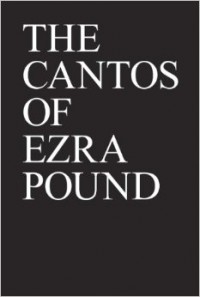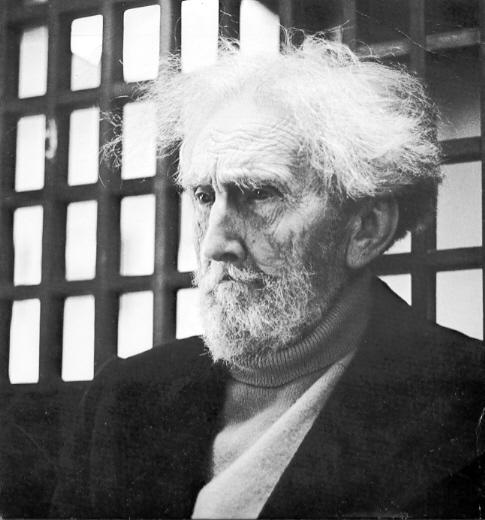Sortes Poundianae
 |
The Cantos of Ezra Pound
by Ezra Pound
New Directions, 1996
896 pages / $25.95 buy from Amazon
|
1. In the Middle Ages, as a practice of divination, as a method of drawing lots and to soothsay, to learn what might be the wrath to come, to draw out a linear progression from a dark mass of chaos, those with access to Virgil’s Aeneid might practice Sortes Vergilianae. The instructions were simple: fetch a copy of the epic poem, let the weary spine fall where it may, and whatever passage the eye lighted on the reader interpreted as indicative of prophecy.
2. My copy of The Cantos of Ezra Pound is a fresh New Directions paperback with the spine still intact. Regardless, it looks ominous. The backdrop black with serifed white letters stamped down on the cover. At twelve years old and knowing nothing of Ezra Pound, I picked the book up because it looked Biblical and heavy, like תֹהוּ וָבֹהוּ, the waters of Genesis 1:2.
3. The Cantos present chaos before the Spirit of God levitates over the deep. Although Pound principally brings forward “light” as his favorite element of spirituality and mysticism, darkness pervades the poem. It’s universally acknowledged that the work turns on an axis based more on Inferno than Paradiso.
4. Interviewed by Donald Hall in The Paris Review, who spent three days with Pound in Italy during the early 1960s, a restless and writer’s block-inflicted Pound comments, “It is difficult to write a paradiso when all the superficial indications are that you ought to write an apocalypse. It is obviously much easier to find inhabitants for an inferno.”
5. After publishing Thrones de los Cantares, the penultimate section of the Cantos, Pound admits, “Okay, I am stuck.” One imagines him gazing out the window, sunlight revealing a Roman street where, if you dig far enough, discoveries of pagan rites abound. He continues, pulling at his beard, “The question is, am I dead.”
6. The aforementioned Hebrew typically translates as “without form and void” (KJV). It can also mean “utter confusion,” a feeling most readers share when tackling the Cantos. Pound’s classic outline for his epic poem, from a letter to his father (who was appropriately, I kid you not, named Homer), begins, “Live man goes down into world of Dead.”
7. Pound, like his hero Odysseus, descended into Hell and still lived to see daylight. Kept outdoors for many weeks near Pisa, Pound was a caged panther, captive of the US military in 1943. During this time or immediately afterwards, he promptly went insane, dubbed mentally unfit to stand trial, housed in the “bughouse” of St. Elizabeths Hospital for thirteen years. As the story goes.
8. To draw lots, to soothsay out of an inferno, is simply not done. It reminds one of the Faust legend, or Robert Johnson’s railroad deal with the devil. Like a Oujia board for literary nerds (or, more properly, “bibliophiles”), a variety of sortes tempt many.
9. But The Cantos beckon. Suck a poor poet into their orbit. They are sirens. Robert Frost mentions, in a 1960 interview with the Paris Review, how Ezra Pound practiced jujitsu on him in a restaurant. “So I stood up, gave him my hand. He grabbed my wrist, tipped over backwards and threw me over his head.” Like its writer, the poem practices a similar sort of action on the reader.
July 29th, 2014 / 12:00 pm
“Literature is language charged with meaning.”
From ABC of Reading
by Ezra Pound
Chapter Four
1
‘Great literature is simply language charged with meaning to the utmost possible degree.’
Dichten = condensare.
I begin with poetry because it is the most concentrated form of verbal expression. Basil Bunting, fumbling about with a German-Italian dictionary, found that this idea of poetry as concentration is as old almost as the German language. ‘Dichten’ is the German verb corresponding to the noun ‘Dichtung’ meaning poetry, and the lexicographer has rendered it by the Italian verb meaning ‘to condense’. READ MORE >
I needed a new bookshelf. before breaking down and ordering one from Staples.com ($49.99 for a wooden 5-shelf) I decided to try the thrift store next door to my apartment. They have a ton of bookshelves, apparently NONE of which are for sale. Probably this is because they’re covered in books which ARE for sale. I didn’t need any books. In fact, books are why I was having this whole shelf-problem in the first place. But then, there, sitting on top of a pile (and btw, if you’re just going to pile the books anyway, why not sell me the shelf? piles work even better on floors than on shelves) I spotted Confucius to Cummings: An Anthology of Poetry edited by Ezra Pound and Marcella Spann. Mine for one hot crumpled dollar bill. No tax. From the back cover: “It is a statement by example of the ‘Pound critical canon’ and, as such, a short course in the history of world poetry…” It will have pride of place on my new bookshelf, which Staples will be delivering sometime tomorrow, along with the pink plastic pencil case ($.50) I ordered to tip the total price over the $50 line and therefore earn free shipping.
Power Quote: Ezra Pound

“The man of understanding can no more sit quiet and resigned while his country lets its literature decay, and lets good writing meet with contempt, than a good doctor could sit quiet and contented while some ignorant child was infecting itself with tuberculosis under the impression that it was merely eating jam tarts.”
—ABC of Reading
[PS- hat tip to my man, Michael Signorelli, who emailed me the quote just now. Do you have any idea how rad it is to have an editor who sends letters that begin: “Have you been reading Pound today? I started up on ABC of Reading again…” ? Well, allow me to give you an idea: it is very, very rad.]
Power Quote: Special T.O.C. edition, for keith n.b., with double special bonus shout-out to Paul Violi

In a comment on yesterday’s “Power Quote” post, one of our regular commenters said he couldn’t find much about M.L. Rosenthal’s The Modern Poets: A Critical Introduction on the web. Well, neither could I, actually, which is one of the reasons that my post had links to some Yeats poems he had written about instead of to anything by Rosenthal himself. So by special request, please find below the T.O.C. to the book, plus some info on Rosenthal, for the edification and enjoyment of all. Before we get to that, however, I want to give a shout-out to Paul Violi. I was lucky enough to study with Paul when I was an MFA at The New School. Of all the poets–hell, all the people–I know, he’s easily one of the best- and widest-read, and is always generous with his vast knowledge when I get a bug up my ass about this or that poetry-related topic and start suddenly shooting him emails. Most recently, that topic has been Ezra Pound. Paul pointed me to Rosenthal specifically for chapter three, “EZRA POUND: THE POET AS HERO.” After–or before–you check out the T.O.C. to this book, I emphatically recommend you click over to Paul’s website and check him out, if you don’t already know his work.
Ounce of Pound

Another point miscomprehended by people who are clumsy at language is that one does not need to learn a whole language in order to understand some one or some dozen poems. It is often enough to understand thoroughly the poem, and every one of the few dozen or few hundred words that compose it.
– “How to Read”
Ounce of Pound: Grad School Edition
In the main I don’t see that teaching can do much more than expose counterfeit work, thus gradually leading the student to the valid. The hoax, the sham, the falsification become so habitual that they pass unnoticed; all this is fit matter for education. The student can in this field profit by his instructor’s experience. The natural destructivity of the young can function to advantage: excitement of the chase, the fun of detection could under favorable circumstances enliven the study.
Whereas it is only maturer patience that can sweep aside a writer’s honest error, and overlook unaccomplished clumsiness or outlandishness or old-fashionedness, for the sake of the solid centre.
-ABC of Reading, p. 193

****SPECIAL EZRA POUND COMPARATIVE LIT BONUS FEATURE*****
When was the last time you read “Visits to St. Elizabeth’s” by Elizabeth Bishop, about going to see Pound when he was institutionalized? Probably a long time, right? Let’s refresh our memories:
And poets.org has the actual poem here. Try reading it out loud.

Education for Indie Heathens
On this site, in a recent post which garnered 200+ comments, someone quoted Ezra Pound; the source, Pound’s instructional text A B C of Reading.

Lego my Ezra
In the book’s introduction Pound writes, “For those who might like to learn. The book is not addressed to those who have arrived at full knowledge of the subject without knowing the facts.” He goes on to describe A B C as a text-book ” ‘for pleasure as well as profit’ by those no longer in school; by those who have not been to school; or by those who in their college days suffered those things which most of my own generation suffered.”
Obviously Pound had HTML’s audience in mind.
After the jump is a passage that hasn’t aged a day since its 1934 publication.

